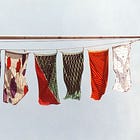Welcome to the summer Friendship Series. Each week, I’ll explore a different aspect of friendship, sharing audio interviews with over a dozen friends, as well as 7 sensory ways to explore friendship: SEE, HEAR, SMELL, TASTE, TOUCH, BALANCE and ENVISION.
Harry: You realize of course that we can never be friends.
Sally: Why not?
Harry: What I'm saying is... and this is not a come-on in any way, shape or form, is that men and women can't be friends because the sex part always gets in the way.
You probably recognize that scene from the romantic comedy ‘When Harry Met Sally.’ It’s been 35 years since that movie was released, and while the gender conversation has since widened, I was curious whether the main premise held true.
When I inquired with my (straight) male friends whether they believe in female-male friendships, they all unequivocally responded yes. But when I asked them about the challenge those friendships present, they all agreed that sexual attraction is the principal one. It seems that some of that tension is unavoidable, at least at first. As a friend explained: “When you’re single, there’s always the question ‘Is it just friends or is this potentially a romantic thing?’ And that can create this weird block.”
Either a bit of stumbling, a potential rejection, or an awkward conversation can clear the air of sexual tension. If we can move through it, we seem to be able to coast on a stable platonic path.
But what happens if the sexual/romantic line is crossed? Does it jeopardize the friendship? According to the friends I interviewed, sex doesn’t ruin a friendship but it does change it. A friend pointed out though that it’s “not necessarily in a bad way.” He further explained: “I never felt like it cost me a friendship, but I have felt it has changed those friendships but in a way I think they were all really good experiences. It made those friendships unique.”
The challenge isn’t just limited to tension between two friends. In some cases, the subject of sex and romance is taboo. As a friend pointed out: “A person’s romantic life is a big part of their life, especially as people get older and become partnered. And I’ve noticed that in a lot of my friendships with women, this part of their life was salted away. And that I would also avoid talking about those aspects of my life with them. I think in talking about romantic or sexual aspects of my life, I became my most male self. And I need to keep that to myself so that I can maintain some illusion about who I am and how I function… And I think those friendships hit a wall because if you can’t talk about a big part of someone's life, and a big part of how people change and grow, you’re a little boxed in there.”
Even though I went into these interviews with the goal of discussing (straight) male-female dynamics, I was surprised by what I also learned about male to male friendships, which have their own set of barriers.
One of my friends shared the challenge of negotiating friendships with other hetero-cis men: “In an American context, there’s also a really deeply ingrained idea around male independence and autonomy that goes back to even the very foundational myth of the country…. the fantasy of the cowboy: this rugged individualist who needs no one, asks for nothing, and makes his way in the world all on the strength of his own. That’s not a story that involves a support system of loving men and women helping him work his farm. In hetero-cis men, there’s a certain amount of shame about being seen. Not being seen how you think you’re supposed to be seen: powerful, in control, handling your shit, needing little to no assistance from anybody. When you’re seen to be vulnerable, small, weak, afraid, upset... that these emotions sometimes come out but there’s so much shame attached to them, that it’s like ‘Oh God, I have to put that right back in the box.’ And it makes it very difficult to build deeper friendships because it’s a charade of one step forward and two step backs.”
Another friend echoed this sentiment: “I think men approach each other a little differently. Our relationships sometimes seem more surface. Even though in your heart you’re like ‘I would do anything for this person,’ you never really express that to each other. And if you do, you’re a little bit drunk – or a lot. But it’s there, there’s this undercurrent of love but it's never spoken of.”
Sexual orientation also adds a nuanced layer to the gender dynamics. One of my straight male friends said that “the best relationships I have with men –– the ones that are the most meaningful to me and feel the most real –– are with gay men. I think it’s because there are elements of gender overlapped and shared experience. And there are ways in which those men, through lived experience, see the world through different eyes. And that can be really rewarding. You feel both understood but also checked somehow – offering a perspective that you don’t see yourself.”
I was curious to learn how friendship gender dynamics evolve as we get older. A number of my friends mentioned that as young kids they mainly had same-gender friends and started diversifying their friendship pool once they got to college or in their 20’s. It seems to take a certain level of maturity to navigate the complexities those relationships demand.
Some of my guy friends reported still having mainly male friends, others have a majority of female friends, and occasionally a balanced split of the two. As a friend noted, “some of it is just circumstance.” He reminded me that he and I met in a workplace that had a majority of women so due to the environment, he ended up having more female friends.
I can recall how my friendships with men evolved over time. When I was very young (elementary school), I was equally friends with boys and girls. Then once the notion of gender differences were formed, and hormones kicked in, male friendships seemed more elusive. During those awkward middle school years, boys became either the enemy or crush material – relationships laced with fear, shame, and curiosity.
Like many of the people I interviewed, it wasn’t until college that I started again having close male friends. The lines didn’t seem as blurry anymore, but there was nonetheless a greater distance than with my female friends.
When I started dating women in my 20’s, my friendship with men suddenly shifted. Whatever underlying thread of sexual remnant was capped off and I seemed to have crossed an invisible threshold. My guy friends started confiding in me regarding their romances. They also felt more naturally themselves around me, less restrained in their speech and body language. In a way, it felt like being let into the boy’s club. They didn’t turn chauvinistic, but they did seem looser, less guarded, stripped off the need to impress. During those years, my male friendships felt at the zenith of intimacy.
Another turning point in friendships is when people enter committed relationships. One might think that getting married might absolve any gender challenges between friends, but in some cases it can add a new strain to friendships.
“What is it about men and women pairing off, ostensibly for a lifetime, that cleaves them from the non-romantic pairings that had once been so easy, so vital?” asks
in her article ‘Where Have All My Guy Friends Gone?’In it, she recounts how one of her closest male friendships became distant once he got involved in a committed romantic relationship. Even though she and her husband befriended their friend’s partner, the dynamics nonetheless shifted. She writes: “We stopped texting and hanging out, just the two of us. Everything I knew about Brent now came secondhand from his wife.”
One of my friends echoed these gender expectations: “Maybe the obstacle is that people are used to being friends with the same gender culturally. So when there’s two male-female couples, it’s almost expected that the guys are going to be friends, and the women are going to be friends. And maybe it would be sort of weird if you tried to scramble that dynamic.”
I’ve noticed how quickly that pattern gets established and I’ve made a concerted effort not to fall into that default mode. Recently, I reached out to a male friend to ask to spend time together. Even though we both appreciate each other’s partners, I noticed how we automatically scheduled double-dates. But I missed connecting one on one with my friend. Instead of accepting this as our friendship fate, I voiced this to him and a few days later, we went for a long hike, just the two of us.
To some extent, it’s natural to have less time for our friendships once we’re in committed partnerships. In some cases (if we’re lucky), we also develop a friendship with our spouse. One of my friends opened up about his wife being his best friend: “I’m going to be the first person she’s trying to go hang out with, and vice versa. And it’s partly why I make less friends - it’s just because [my wife] is my built-in everything. (...) It made me roll my eyes in the past but I really do think your spouse or significant other can, or even should, be your best friend. Not that you shouldn't have others or someone outside that. But we have a lot of fun together and go through all the highs and lows so it makes sense.”
Entering committed romantic partnerships can even have a positive effect on friendships. One of my friends explained how rewarding it can also be to see your friends in their romantic relationships: “If you’ve known the person for a very long time, it can be very life-affirming to see them move into relationships, find partners, etc. It’s really cool when you’ve known someone for a long time and you know where they started and you can see how far they’ve traveled.”
For this week’s interview, I originally wanted to solely focus on the male-female friendship so I interviewed a few of my straight guy friends, including
, , Brandon D., and Michael Reynolds. But I ended up getting curious about gender dynamics within queer friendships, so I also included one of my lesbian friends Bianca Butti (I would have liked to also get a gay male friends’ perspective, but alas).Out of all the Friendship interviews, this one was probably the most sensitive and vulnerable discussion. We breached the topic of sex, gender expectations, and friendship after marriage. I’m incredibly inspired and amazed by my friends’ openness and honesty – thank you, thank you. The audio interviews are available below for paid subscribers and today is the last day to receive 20% off:
This week’s sensory suggestions was curated with a little help from my friends. It includes books, films, podcasts and even musicals that explore the dynamics of gender in friendships.
In Joy,
Sabrina
PS: to catch up on previous editions of the Friendship Series, visit the links below










